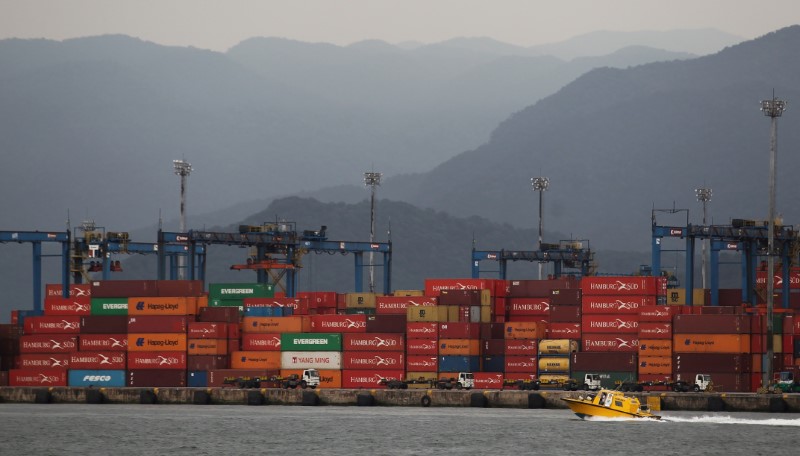 © Reuters. Containers are seen during a workers’ strike at Latin America’s biggest container port in Santos
© Reuters. Containers are seen during a workers’ strike at Latin America’s biggest container port in SantosBy Tatiana Bautzer
SAO PAULO (Reuters) – Brazil’s economic recovery was weaker than expected in the fourth quarter due to fluctuations in agricultural exports, data showed on Thursday, indicating a gradual but more widely dispersed recovery in Latin America’s largest economy.
Gross domestic product grew 0.1 percent from the prior three months, according to figures from the government statistics agency IBGE, falling short of the 0.4 percent median estimate in a Reuters poll of economists.
On an annual basis, GDP grew 2.1 percent in the quarter, below the 2.5 percent average estimate of the Reuters poll.
For the year as a whole, Brazilian GDP grew 1 percent in 2017, slightly below median estimates of 1.1 percent growth.
“Growth is taking shape. It is more widely spread among economic sectors and that improves its quality,” said Roberto Padovani, chief economist at brokerage Votorantim, pointing to an improvement in capital spending as a sign of business confidence.
Gross fixed capital formation grew 2 percent in the fourth quarter, above the 1.8 percent growth in the third quarter.
Padovani said the weak figures should calm down analysts who were growing overly optimistic about prospects for economic growth in 2018. Votorantim was keeping its estimate of 3.2 percent growth this year, he said
“It is clearer that the recovery is gradual,” Padovani said.
Finance Minister Henrique Meirelles told a news conference that short-term fluctuations in the harvest had impacted the fourth-quarter growth figures, but Brazil’s agricultural sector remained on track for record crops this year.
He said Brazil’s economy, worth some $1.8 trillion, was still on track to grow 3 percent this year.
Rebeca Palis, coordinator at the IBGE statistics agency, said the fourth quarter numbers suffered due to the negative result of foreign trade, in particular smaller agricultural exports.
“Exports were affected by a stronger real and also by the unwinding of an earlier jump in agricultural exports reflecting bumper harvests,” she said.
In a note to clients, Neil Shearing, chief emerging markets economist at Capital Economics, cited the trade results as “the first sign that the strength of the real is becoming a problem for Brazilian producers.”
The real was trading at around 3.26 to the dollar on Thursday, roughly in the range where it has traded for the past year and a half.
Fusion Media or anyone involved with Fusion Media will not accept any liability for loss or damage as a result of reliance on the information including data, quotes, charts and buy/sell signals contained within this website. Please be fully informed regarding the risks and costs associated with trading the financial markets, it is one of the riskiest investment forms possible.
Source: Investing.com




























